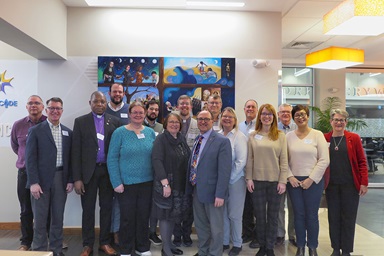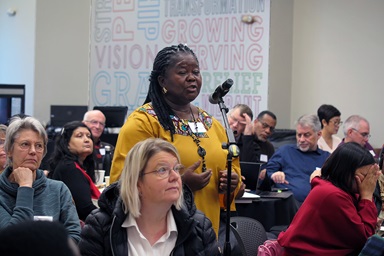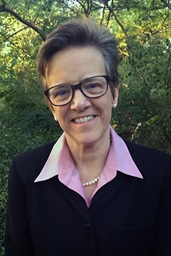 Bishops Deborah Lieder Kiesey (left) and Marcus Matthews give the benediction during evening worship at the 2012 United Methodist General Conference in Tampa, Fla. A UMNS photo by Mike DuBose. Click on image to enlarge.View more photos.
Bishops Deborah Lieder Kiesey (left) and Marcus Matthews give the benediction during evening worship at the 2012 United Methodist General Conference in Tampa, Fla. A UMNS photo by Mike DuBose. Click on image to enlarge.View more photos.Hours after delegates at the 2012 General Conference voted to keep the denomination's stance on homosexuality, two bishops challenged United Methodists to love those who may be outside their boat.
Leading the evening worship on May 3, Dakotas Area Bishop Deborah Lieder Kiesey and Upper New York Area Bishop Marcus Matthews urged delegates to create a community of love by caring for one another.
"We need each other. ...Practice blessing each other, rather than cursing each other. There is always more of love. There is always more of God," the two bishops declared in a joint benediction at the end of a worship service that featured the Junaluska Singers from Lake Junaluska, N.C., and Shalom Singers from Haiti by video.
Kiesey said the work at the General Conference may be important, "and yet, &ellipsis;when all is said and done, the simple truth is that what really matters are these words of Christ's&ellipsis;'Feed my sheep.'"
Delivering the sermon "The Final Encounter," based on the John 21 text, Kiesey urged the delegates to think anew about adaptive change and adaptive learning.
"I believe that true 'adaptive change' begins when, first, we open our eyes and actually see another side of this boat we've been traveling in," she said to a huge applause. "It begins with the possibility that someone - not even in the boat - can offer us a new way of working and being and living out our faith."
'Feed my sheep'
To Kiesey, real adaptive change begins "when we finally listen to the One on the Shore who asks a simple, yet dangerous, life-filling, life-challenging question - 'Will you please feed my sheep?'
"Jesus didn't say, feed only my sheep who are theologically correct, able to be counted in our numbers, who agree with me. He didn't ask about theology or biblical understanding or denomination or lifestyle or language or disability."
She wondered if United Methodists are caring for Jesus' sheep by offering them food for the soul to guide their daily living and "offering them hope in a troubled world."
Reflect the community
In his testimony, Matthews called on the United Methodists to reflect the spirit of his former home, where "no one was ever left out." He told the delegates that churches should be true reflections of the broader communities they serve.
"We share with each other, not in spite of the tension we may feel just under the surface, but because of it," he said.
Matthews said Communion Sunday was always special in his home church in Florence, S.C., as one could easily see all those who would come forward to receive the bread and the cup.
"Every element of our local community was represented in that experience&ellipsis;among those who came forward were those who happened to be straight and those who were known to be gay," he noted. "But all came to the same table and were united in our fellowship of Holy Communion within the living Christ."
"And in that church - no one was ever left out!"
Matthews said those earlier days in his local church were foundational for him in his faith journey. "Little did I know at the time that God was using these moments to shape and form me spiritually."
In a sign of community and love, the delegates and the visitors were asked to "come to the Table of Grace" and share buns as the musicians sang, "They will know we are Christians by our love."
*Mulenga is the director of communications for the Upper New York Annual (regional) Conference.
News media contact: Maggie Hillery, Tampa, Fla., (813) 574-4837 through May 4; after May 4: (615) 742-5470 or [email protected].
Like what you're reading? Support the ministry of UM News! Your support ensures the latest denominational news, dynamic stories and informative articles will continue to connect our global community. Make a tax-deductible donation at ResourceUMC.org/GiveUMCom.



